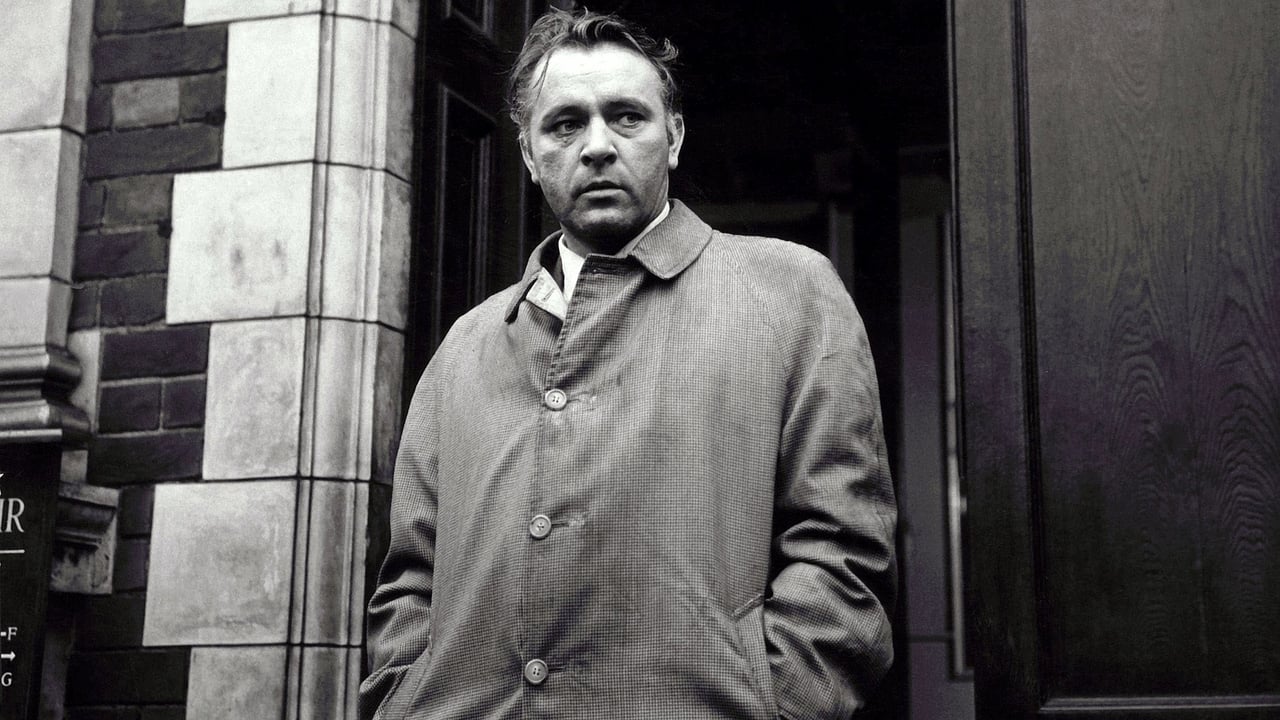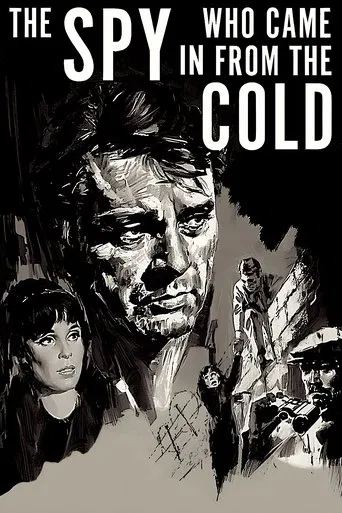

Although it has its amusing moments, in eneral the plot does not convince.
... View MoreExcellent characters with emotional depth. My wife, daughter and granddaughter all enjoyed it...and me, too! Very good movie! You won't be disappointed.
... View MoreA clunky actioner with a handful of cool moments.
... View MoreGreat movie. Not sure what people expected but I found it highly entertaining.
... View MoreEven that the film is fine it's years light distance from the book, so many things get behind !! But letting aside unfair comparison with a spectacular novel, the film deserves some praising.First at all is that a complicated plot is masterfully exposed, you get to understand it without being a genius. And this is not trivial matter, because usually spy films get too confused and wrapped into incoherence. A high qualification for the script, is clear enough. Richard Burton plays an excellent character, he stares the rest of the characters and even being the film black and white his expression and his light eyes make an impression.
... View MoreJohn Le Carre (Novel), Martin Ritt (Director), Richard Burton (Star), and Oswald Morris (Cinematography) all Combine and Contribute to what Some Say is the Best Spy Movie Ever.A Total Antecedent to the Immensely Popular James Bond Zeitgeist that was Exploding onto the Pop Culture Scene, this 1965 Film was a Reality and Gut Check to the Real Cold War Anxiety (the Cuban Missile Crisis) that Permeated Everyday Life.Le Carre's Novel came Straight from "The Horse's Mouth" and the Author's Own Experience at MI-5, MI-6. Ritt was a No-Nonsense Director Prone to Realism and the Plight of "People" (Humanism) and was Blacklisted for Leaning Left, Burton was generally Considered one of the Best Actors of the Era, and Morris was Determined to give the Picture the Darkest, Bleakest, Stone Cold Look Imaginable.All of these Artists Delivered an Espionage Film, a Neo-Noir with a New Subject, and to this Day it is the Standard and Measure for all Spy Movies.A Good Supporting Cast, Claire Bloom, Oskar Wenner, and Cyril Cusack and others with a Fine Script by Paul Dehn, all Help make this a Completely Unique Experience, especially for its Time. In Fact, it is an Artistic Accumulation Across the Board and the Film is one of the Great Ones.It's "James Bond" Unplugged and a Gritty, Against the Grain Entry in the Glut of Garish and Goofy Spy Stuff and Spoofs of Spy Stuff that were Everywhere in the Mid 1960's. It was Super Realistic and in Black and White. It was more Enlightening than Entertaining.It Bombed at the Box Office.
... View MoreMartin Ritt's cinematic re-enactment of John le Carré's sensational spy novel, is a somber pièce- de-résistance countervails the much sought-after James Bond franchise (which, over 60 years later, is still a juggernaut groovy train), de-glamorizes its Martini, shaken not stirred screen preconception, and adjusts an intractably realistic spin on the treachery and disillusion of the Janus-faced veiled by the Cold War paranoia. One year after the erection of the Berlin Wall, Alec Leamas (Burton, supremely jaded and miffed) is devolved from the head of UK's West Berlin office after one of his best double-agent is shot dead in the chilling opening long shot. Back to London, a dispirited Alec is reassigned as an insignificant librarian, and strikes up a romantic liaison with his younger co-worker, the self-effacing Nancy Perry (Bloom), although they hold different political persuasions, Nancy is a communist, the idealistic type. After an impulsive physical assault on Patmore (Lee, the first"M" in the Bond series), a grocery shop owner who possibly holds a racist animosity towards Alec's Irish lineage, he is put in prison, and after his release, he is contacted by the member of the East German Intelligence Service, deemed as a potential defector on the face of his demeaning situations. Soon the story reveals that everything aforementioned is a front, in fact, Alec is undertaking a clandestine mission designated by Control, the chief of UK's Secret Intelligence Service (an inscrutably poised Cyril Cusack, not minces word about the vocation's seedy modus operandi), to act as a faux-defector to East Germany and deliver incriminating information to frame a high rank East German officer Mundt (van Eyck) as a paid informant, so that Mundi will be executed by his enterprising deputy Fiedler (Werner). So Alec assiduously climbs the pecking order to gain the trust of his enemies (where Ritt knowingly jeers at the callous rank superiority in the communist party) and finally reaches East Germany where he is under personal interrogation by Fiedler, he tactfully doles out spotty disinformation and gradually earns Fiedler's trust. Everything goes well according to the plan, during a secret tribunal where Mundt is tried, Fiedler's impassioned accusation seems spotless, but one person's appearance tips the scale, but that is not all, the film still pulls the wool over our eyes, until a final twist, in the fashion of Billy Wilder's WITNESS FOR THE PROSECUTION (1957), clears the ulterior motive, and casts an unnerving pathos when Alec delivers the revealing condemnation about the true nature of spy, he and Nancy are given the chance to scramble that damned wall for safety, but at that point, all bets are off. Unflinching in foregrounding its source novel's ingrained skepticism and fatalism, THE SPY WHO CAME IN FROM THE COLD sustains a compelling narrative arc without resorting to action spectacles (gunshots only being fired in two occasions), meanwhile DP. Oswald Morris' expressively noir-ish cinematography and Sol Kaplan's indelibly enthralling score speak volumes of the bleak context where the world is governed by sinister conspiracies and people like Alec and Nancy, however diligent or innocent, are expendable pawns who can never outrun their sorry fate, In retrospect, the film should have been Mr. Burton's crowning point to take that Oscar golden statue which would elude his entire life, he is nominated but loses out to Lee Marvin's Manichaean turn in CAT BALLOU (1965), which as time goes by, looks like a travesty to an increasing extent. Mr. Burton is absolutely at his most impenetrable in limning Alec's flinty carapace during his high-wire act, and most poignant in emoting his smoldering frustration and self-loath when he realizes that he has accidentally consummated his assignment, but at the expense of his conviction to humanity. The supporting cast is also exceptional, significant players like Bloom and Werner, instigate great two-handers - the former plies the story with a tinge of well-balanced warmth whereas the latter is memorably eloquent and radiant to fight for his noble cause, respectively with Mr. Burton, without being overshadowed by the latter's incandescent flair, and a solemn-looking Peter van Eyck ekes out a transfixing about-face moment, with a bloodthirsty dagger nevertheless in his hands. An outright engrossing spy thriller, pulls no punches in challenging its indulgent audience, and steadfastly establishes its growing cachet as a film par excellence in its own genre.
... View MoreI am a massive fan of John le Carre's books. I always worry when they are adapted into movies that they will not be able to capture the complexity of his story lines. It wasn't until recently that I stumbled across this movie and decided to watch it. I was very happy overall with the adaptation. I still feel that there hasn't been a le Carre adaptation yet made that matches the complexity of his books - but from the book itself this movie did itself justice in the period it was filmed. Richard Burton was excellent as Alec Leamus - he exacted the role of the dark and brooding spy with maximum effect. His acting gave it the weight that I would have expected from the novel. The supporting characters - particularly Oskar Werner also did a great job in the adaptation. It is dated compared to modern thrillers and espionage movies - but many of the scenes totally encapsulate the original story line. I still think that a modern re make done the right way could do further justice to this incredibly twisted story line - but this adaptation exceeded my expectancy level with it's superb acting. You definitely need to pick the right time to watch it - it does require keen attention. But when you do it's worthy viewing and strong acting performances render it an underrated success.
... View More